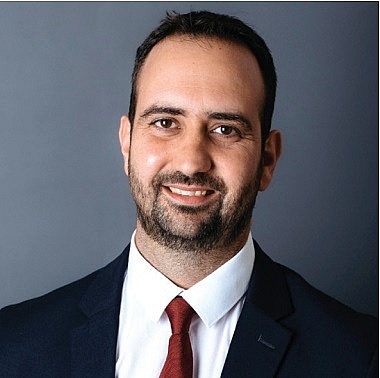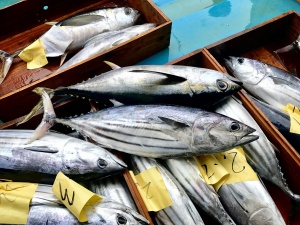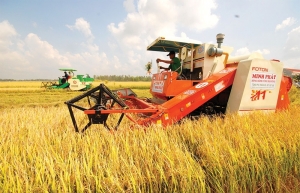Israel and Vietnam on brink of substantial trade deal
What is the current status of the Vietnam-Israel Free Trade Agreement (VIFTA)?
 |
| Gal Saf, head of the Economic and Trade Mission under the Embassy of Israel in Vietnam |
The negotiations concluded successfully and officially during the visit of Minister of Industry and Trade Nguyen Hong Dien in early April, when he met with the Israeli Minister of Economy and Industry, Nir Barkat.
The formal announcement of the conclusion of this stage led to the beginning of the next stage called “legal scrubbing”, in which both countries prepare the agreement drafts for signing. The following stages will be signing the agreement, the approval process in the legal systems of both countries, and the date of entering in force. I believe that it is a great new step in our ever-warming relations. As we celebrate 30 years of ties this year, this agreement is expected to boost bilateral trade even further.
What are the benefits for Israeli and Vietnamese businesses under this agreement?
Vietnam and Israel have a stable and steady-growing bilateral trade. We have seen a steady increase over the years and the overall trade has reached $1.4 billion in 2022.
We are witnessing more and more Israeli and Vietnamese companies in recent years expressing an interest to learning more about business opportunities in both markets and to pursuing diverse sectors, such as agriculture technologies, cybersecurity, medical equipment, digital health solutions, fintech, water, cleantech, energy, and more. The main advantage will be lowering customs for both countries bilateral trade, that will help exporters and importers be more competitive in these markets.
The agreement will allow easier access for exporters and business owners to the markets of both countries. That means easier establishment of factories in Vietnam for Israeli companies, and for research and development centres or tech investments in Israel for Vietnamese companies and a more equal playing ground, versus competitors from other countries in both markets.
In addition, the agreement will include chapters on trade in services, investment protection, and regulation, as Vietnam and Israel will be more coordinated and will assist businesses from both sides, not only in Israel and Vietnam, but also in completing markets. In fact, a big part of the bilateral trade between Israel and Vietnam is the trade of services. In the last two years, Israel’s global export was primarily services (51 per cent) and not goods. The investment chapter of the agreement will support and encourage bilateral investments and consist of several mechanisms whose goal is to increase transparency and certainty in the investment process at both countries.
What are the key sectors that will be impacted by this deal?
It is hard to go into details before the agreement is signed but I can assume that the already-leading trading sectors between the countries will show an increase in trade, as well as new sectors will be promoted and be made attractive due to changes in customs and regulation. The leading existing sectors are chemicals, electronic equipment, optical and mechanical machinery, and fresh produce and food. In an example, the customs of dried fruits, cashew nuts, black pepper, tuna, and more will drop to zero after the signing of the agreement, some gradually within a few years.
For new sectors, you can find cars from Vietnam to Israel that will drop from 7 per cent to zero in seven years from the signing, Israeli wine that will be lowered gradually from 50 per cent to zero and some Israeli cosmetics that will be cut down from 22 per cent to zero in five years.
The Israeli Trade Mission to Vietnam will make public announcements of the specific advantages and tailored seminars to trading companies, once the agreement is signed and the details will be official.
What are the challenges for Israeli and Vietnamese businesses?
I am not convinced that it adds any challenge to the trade between the countries, instead it will solve existing challenges and will make it easier and more profitable for Israelis and Vietnamese to do business together. But in terms of business culture, both Vietnam and Israel have a unique economic scenery and business environment. It takes time to master the subtleties of the business culture and even the actual business potential. However, Vietnam is a huge market of over 100 million people who is growing at an astronomical pace, whereas Israel is a home to the most advance and fastest-moving innovation engine in the world. Both countries are well worth the investment of time and other resources.
What opportunities do Israeli businesses see in Vietnam, and how will this move help to realise these opportunities?
Israeli exporters, importers, and investors are truly interested in the opportunities Vietnam has to offer. In the last five years, the trade between the countries increased by 35 per cent and I expect this number to grow significantly after the signing of the VIFTA. We can assume that the interests we saw in importing from Vietnam textiles, fresh produce, and more will increase, as well the Vietnamese interest in Israeli cosmetics, medical equipment, green energy solutions, and more.
In addition, we have seen an increasing interest from Israeli companies in establishing manufacturing facilities in Vietnam or collaborating with local factories.
 | 2020 Israel film festival to open in Hanoi, HCM City The 2020 Israel Film Festival is slated to take place in Hanoi on November 7-11 and HCM City on November 21. |
 | Kim Duyen to represent Vietnam at Miss Universe 2021 in Israel Nguyen Huynh Kim Duyen, the runner-up of Miss Universe Vietnam 2019, will represent the country at this year’s Miss Universe global event, to be held in the resort city of Eliat in Israel this December. |
 | Vietnam becomes largest tuna supplier to Israel Vietnam has become the largest tuna exporter to the Israeli market after demand from the market boosted in the first haft of the year. |
 | Israel and Vietnam heading to deal Vietnam and Israel are preparing to sign a bilateral free trade agreement to beef up trade and investment ties, with the Middle Eastern country eager to engage in high-tech agricultural projects in the Southeast Asian market. |
What the stars mean:
★ Poor ★ ★ Promising ★★★ Good ★★★★ Very good ★★★★★ Exceptional
Related Contents
Latest News
More News
- Siam Cement Group announces 2025 results amid global headwinds (February 11, 2026 | 11:44)
- Rising consumption and travel fuel ‘Tet season’ stocks (February 11, 2026 | 11:43)
- Education as strategic capital: why Dwight School Hanoi represents a long-term investment in Vietnam’s future (February 10, 2026 | 19:00)
- Green logistics–the vital link in the global energy transition (February 09, 2026 | 19:35)
- Wages and Lunar New Year bonuses on the rise (February 09, 2026 | 17:47)
- Temporary relief for food imports as businesses urge overhaul of regulations (February 07, 2026 | 09:00)
- Opella and Long Chau join forces to enhance digestive and bone health (February 06, 2026 | 18:00)
- Vietnam-South Africa strategic partnership boosts business links (February 06, 2026 | 13:28)
- Sun PhuQuoc Airways secures AJW Group support for fleet operations (February 06, 2026 | 13:23)
- Pegasus Tech Ventures steps up Vietnam focus (February 05, 2026 | 17:25)

 Tag:
Tag:
















 Mobile Version
Mobile Version